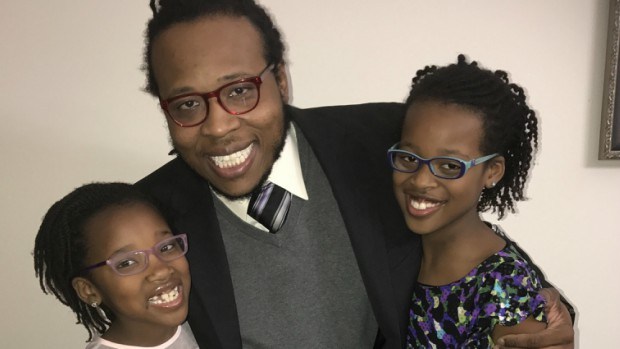
By Kimberly Wilson
Being a parent and a police officer— especially in today’s heightened racial climate—is extremely challenging and requires many family sacrifices. Enrique Simmons, a husband and father of three knows first-hand how difficult it is.
The Washington, D.C. police officer has served the Metropolitan Police Department(DC) on their overnight shift all 12 of those years. And while many think that being a good father simply means you must always be present, Simmons is proof that fatherhood comes in many different forms.
Simmons is Black and blue. One who may never be home when his children have nightmares or fall out of the bed, but who loves his family and his job, and wouldn’t have it any other way. And while many police departments across the country are embroiled in race and equity issues, Simmons is a Black officer on the other side, with one goal: protect his family at all costs. For him, that starts with serving his local community.
In an interview with theGrio for our #ThisIsBlackFatherhood series, Simmons shares some of the juggles of balancing work and fatherhood, how it’s changed him, and the responsibilities that he faces raising a Black son, while also trying to shape his view of law enforcement.
_______________________________________________________________________
TG: What is the names and ages of your children?
ES: Our eldest is our daughter, JuLin. She’s 8. Sanai is our middle child and second daughter. She’s 7. And Enrique III is our third child. He’s 5.
TG: What does fatherhood mean to you?
ES: Fatherhood means being better than my father. My father was from Panama so his method of fatherhood and showing love was to provide physically, but not emotionally. So it wasn’t until he was able to love on his grandkids, and he and I were able to reflect on our shared experience of my childhood, that I realized that he did the best he could, and I’m grateful for that. And now I want to do better. I don’t want to have to wait as long to provide physically and emotionally as well.
TG: Has fatherhood changed you at all? If so, how?
ES: It has required me to have greater patience. Reading all of the parenting books, watching all of the videos and shows, I learned that communication has to come before consequences. It makes me more understanding and a better husband. Fatherhood requires you to sacrifice and plan. Our family is on a schedule. Bedtime at 6:30 p.m. every night since they were infants and up at 6 a.m. the next day. Dinner at 5:30 p.m. Homework, bedtime stories, prayers. All of that is from planning. Children flourish with structure and parents do too.
TG: What’s the biggest lesson you’ve learned since becoming a father?
ES: Other than teaching your daughters to wipe from front to back? Ha! Listening. Definitely listening. With my wife sometimes I can pretend and fill in the holes later. But kids are very perceptive. Even in the most inane details of their long stories and repetitive questions they are telling us things they feel and think and what they want and are afraid of. And often what they don’t say, what they aren’t saying, is what we must listen for to protect them and support them and help them become who they’re created to be.
TG: Do you feel a weighted responsibility, especially as a law enforcement agent, raising a Black son in today’s racial climate?
ES: Yes. Especially because of the city I work in. I see the worst of the worst. We have some good kids with troubled parents and some troubled kids with great parents. I see all of those interactions, I take note, and I try to learn from all of those stories to help me be better. I see kids at their worse. And every once in awhile I get to interact with children in a positive way, but it’s definitely sobering and impacts how I approach raising my kids…my son. When I approach it from a race perspective, I find that I automatically take on this liaison role on the job: offering explanations for why a Black or brown young person may be acting the way he or she is to non-minority officers, or what circumstances may have contributed to why we’re interacting with that young person in that moment. It’s a tiring role.
TG: What do you tell your son (and even daughters), who may grow up to have very negative views of law enforcement? What do these conversations look like?
ES: My goal is to provide positive law enforcement views to my children through positive interactions from a young age. I want them to have those personal interactions as a comparison, so it’s not just me telling them but also showing them the diversity of law enforcement. We spend time with other law enforcement families, my coworkers and their children. When the time is right, the conversations will be coupled with action so they’ll see how we do our jobs and an understanding of how we’re trained, what’s expected of us, and how we do our jobs. The goal isn’t to force them to believe what I know–that cops reflect the general population–but to help inform their own opinion. I would hope that me being a good father would show them that not all cops are bad, that we’re human and we make mistakes. It’s a metaphor for fatherhood and parenting: you try your best, rely on what you know, and you hope you don’t get it wrong.


